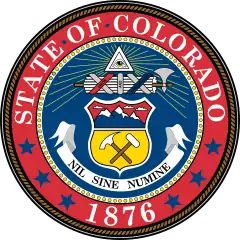Colorado's congressional districts
Colorado is divided into 7 congressional districts, each represented by a member of the United States House of Representatives.

The districts are currently represented in the 117th United States Congress by 4 Democrats and 3 Republicans.
History
The Territory of Colorado was represented by one non-voting Delegate to the United States House of Representatives from its organization on Thursday, February 2, 1861, until statehood on Tuesday, August 1, 1876.
The State of Colorado was represented by one United States Representative elected at-large from statehood in 1876 until the end of the 52nd United States Congress in 1893. Colorado was represented by two United States Representative elected from two congressional districts from 1893 until the end of the 57th United States Congress in 1903. Colorado was represented by three United States Representatives elected from two districts and one at-large from 1903 until the end of the 62nd United States Congress in 1913. Colorado was represented by four United States Representatives elected from two districts and two at-large in the 63rd United States Congress from 1913 until 1915.
Since the U.S. election of 1914, all U.S. Representatives from the State of Colorado have been elected from congressional districts. Colorado has been represented by four United States Representatives from 1913 until the end of the 92nd United States Congress in 1973, five United States Representatives from 1973 until the end of the 97th United States Congress in 1983, six United States Representatives from 1983 until the end of the 107th United States Congress in 2003, and seven United States Representatives since 2003.
Current districts and representatives
List of members of the Colorado United States House delegation, their terms, their district boundaries, and the districts' political ratings according to the CPVI. The delegation has a total of 7 members, including 4 Democrats, and 3 Republicans as of 2018.
| District | Representative | Party | CPVI | Time in office | District map |
|---|---|---|---|---|---|
| 1st | .jpg.webp) Diana DeGette (D-Denver) Diana DeGette (D-Denver) |
Democratic | D+21 | January 3, 1997 – present | .tif.png.webp) |
| 2nd |  Joe Neguse (D-Lafayette) Joe Neguse (D-Lafayette) |
Democratic | D+9 | January 3, 2019 – present | .tif.png.webp) |
| 3rd |  Lauren Boebert (R-Silt) Lauren Boebert (R-Silt) |
Republican | R+6 | January 3, 2021 – present | .tif.png.webp) |
| 4th |  Ken Buck (R-Windsor) Ken Buck (R-Windsor) |
Republican | R+13 | January 3, 2015 – present | .tif.png.webp) |
| 5th | .jpg.webp) Doug Lamborn (R-Colorado Springs) Doug Lamborn (R-Colorado Springs) |
Republican | R+14 | January 3, 2007 – present | .tif.png.webp) |
| 6th |  Jason Crow (D-Aurora) Jason Crow (D-Aurora) |
Democratic | D+2 | January 3, 2019 – present | .tif.png.webp) |
| 7th |  Ed Perlmutter (D-Arvada) Ed Perlmutter (D-Arvada) |
Democratic | D+6 | January 3, 2007 – present | .tif.png.webp) |
Historical and present district boundaries
Table of United States congressional district boundary maps in the State of Colorado, presented chronologically.[2] All redistricting events that took place in Colorado between 1973 and 2013 are shown.
| Year | Statewide map | Denver highlight |
|---|---|---|
| 1973–1982 | 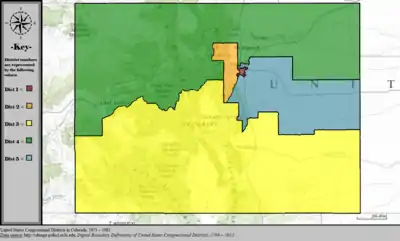 |
%252C_1973_%E2%80%93_1982.tif.png.webp) |
| 1983–1992 | 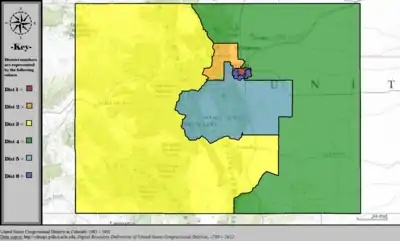 |
%252C_1983_%E2%80%93_1992.tif.png.webp) |
| 1993–2002 | 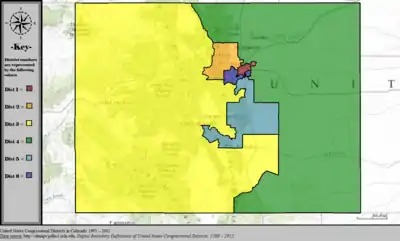 |
%252C_1993_%E2%80%93_2002.tif.png.webp) |
| 2003–2013 | 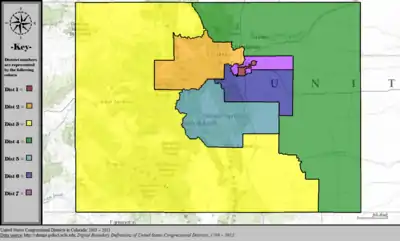 |
%252C_2003_%E2%80%93_2013.tif.png.webp) |
| Since 2013 | 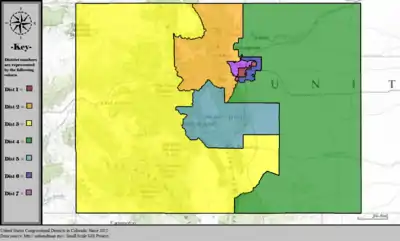 |
%252C_since_2013.tif.png.webp) |
Obsolete districts
See also
- Outline of Colorado
- List of United States congressional districts
- Index of Colorado-related articles
- State of Colorado
- United States of America
- United States Congress
- United States congressional delegations from Colorado
- List of United States Senators from Colorado
- Colorado Congressional Districts
- United States congressional delegations from Colorado
- United States Congress
References
- "The national atlas". nationalatlas.gov. Archived from the original on February 22, 2014. Retrieved February 22, 2014.
- "Digital Boundary Definitions of United States Congressional Districts, 1789–2012". Retrieved October 18, 2014.
